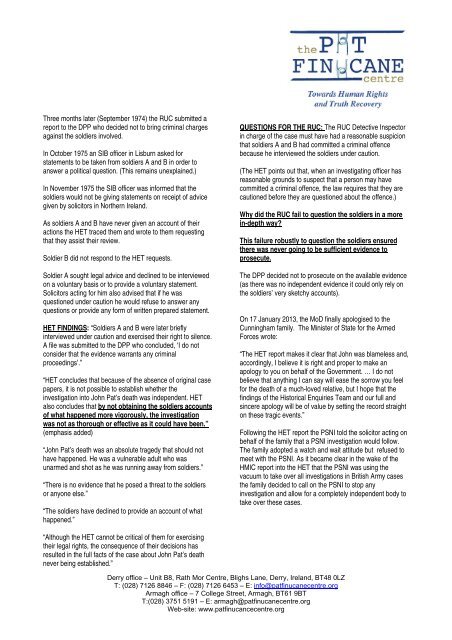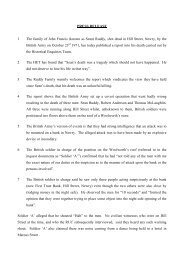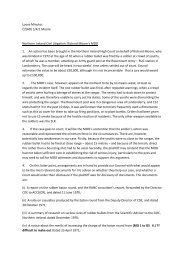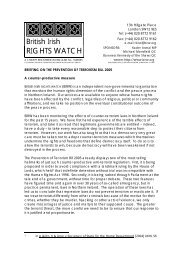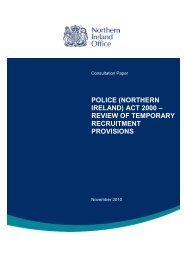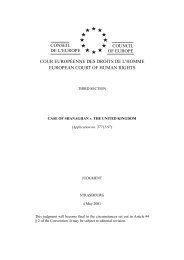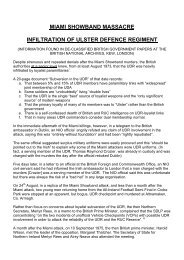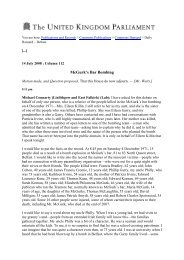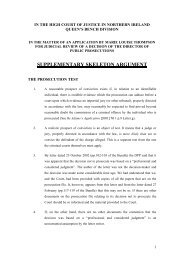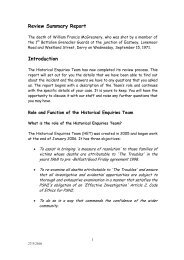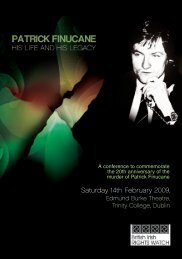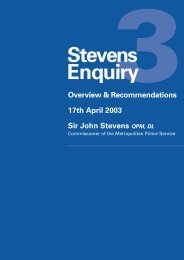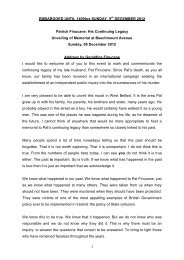John Patrick Cunningham - The Pat Finucane Centre
John Patrick Cunningham - The Pat Finucane Centre
John Patrick Cunningham - The Pat Finucane Centre
Create successful ePaper yourself
Turn your PDF publications into a flip-book with our unique Google optimized e-Paper software.
Three months later (September 1974) the RUC submitted a<br />
report to the DPP who decided not to bring criminal charges<br />
against the soldiers involved.<br />
In October 1975 an SIB officer in Lisburn asked for<br />
statements to be taken from soldiers A and B in order to<br />
answer a political question. (This remains unexplained.)<br />
In November 1975 the SIB officer was informed that the<br />
soldiers would not be giving statements on receipt of advice<br />
given by solicitors in Northern Ireland.<br />
As soldiers A and B have never given an account of their<br />
actions the HET traced them and wrote to them requesting<br />
that they assist their review.<br />
Soldier B did not respond to the HET requests.<br />
Soldier A sought legal advice and declined to be interviewed<br />
on a voluntary basis or to provide a voluntary statement.<br />
Solicitors acting for him also advised that if he was<br />
questioned under caution he would refuse to answer any<br />
questions or provide any form of written prepared statement.<br />
HET FINDINGS: “Soldiers A and B were later briefly<br />
interviewed under caution and exercised their right to silence.<br />
A file was submitted to the DPP who concluded, ‘I do not<br />
consider that the evidence warrants any criminal<br />
proceedings’.”<br />
“HET concludes that because of the absence of original case<br />
papers, it is not possible to establish whether the<br />
investigation into <strong>John</strong> <strong>Pat</strong>’s death was independent. HET<br />
also concludes that by not obtaining the soldiers accounts<br />
of what happened more vigorously, the investigation<br />
was not as thorough or effective as it could have been.”<br />
(emphasis added)<br />
“<strong>John</strong> <strong>Pat</strong>’s death was an absolute tragedy that should not<br />
have happened. He was a vulnerable adult who was<br />
unarmed and shot as he was running away from soldiers.”<br />
“<strong>The</strong>re is no evidence that he posed a threat to the soldiers<br />
or anyone else.”<br />
“<strong>The</strong> soldiers have declined to provide an account of what<br />
happened.”<br />
QUESTIONS FOR THE RUC: <strong>The</strong> RUC Detective Inspector<br />
in charge of the case must have had a reasonable suspicion<br />
that soldiers A and B had committed a criminal offence<br />
because he interviewed the soldiers under caution.<br />
(<strong>The</strong> HET points out that, when an investigating officer has<br />
reasonable grounds to suspect that a person may have<br />
committed a criminal offence, the law requires that they are<br />
cautioned before they are questioned about the offence.)<br />
Why did the RUC fail to question the soldiers in a more<br />
in-depth way?<br />
This failure robustly to question the soldiers ensured<br />
there was never going to be sufficient evidence to<br />
prosecute.<br />
<strong>The</strong> DPP decided not to prosecute on the available evidence<br />
(as there was no independent evidence it could only rely on<br />
the soldiers’ very sketchy accounts).<br />
On 17 January 2013, the MoD finally apologised to the<br />
<strong>Cunningham</strong> family. <strong>The</strong> Minister of State for the Armed<br />
Forces wrote:<br />
“<strong>The</strong> HET report makes it clear that <strong>John</strong> was blameless and,<br />
accordingly, I believe it is right and proper to make an<br />
apology to you on behalf of the Government. … I do not<br />
believe that anything I can say will ease the sorrow you feel<br />
for the death of a much-loved relative, but I hope that the<br />
findings of the Historical Enquiries Team and our full and<br />
sincere apology will be of value by setting the record straight<br />
on these tragic events.”<br />
Following the HET report the PSNI told the solicitor acting on<br />
behalf of the family that a PSNI investigation would follow.<br />
<strong>The</strong> family adopted a watch and wait attitude but refused to<br />
meet with the PSNI. As it became clear in the wake of the<br />
HMIC report into the HET that the PSNI was using the<br />
vacuum to take over all investigations in British Army cases<br />
the family decided to call on the PSNI to stop any<br />
investigation and allow for a completely independent body to<br />
take over these cases.<br />
“Although the HET cannot be critical of them for exercising<br />
their legal rights, the consequence of their decisions has<br />
resulted in the full facts of the case about <strong>John</strong> <strong>Pat</strong>’s death<br />
never being established.”<br />
Derry office – Unit B8, Rath Mor <strong>Centre</strong>, Blighs Lane, Derry, Ireland, BT48 0LZ<br />
T: (028) 7126 8846 – F: (028) 7126 6453 – E: info@patfinucanecentre.org<br />
Armagh office – 7 College Street, Armagh, BT61 9BT<br />
T:(028) 3751 5191 – E: armagh@patfinucanecentre.org<br />
Web-site: www.patfinucancecentre.org


